1893-1894 - The University of North Carolina at Chapel Hill
1893-1894 - The University of North Carolina at Chapel Hill
1893-1894 - The University of North Carolina at Chapel Hill
You also want an ePaper? Increase the reach of your titles
YUMPU automatically turns print PDFs into web optimized ePapers that Google loves.
APPENDIX. 175<br />
environment and affections other than tubercular.<br />
Wh<strong>at</strong> peculiar di<strong>at</strong>hesis, we may ask, or hereditary tendency, is it<br />
tli<strong>at</strong> opens wide tlie doors for an entrance <strong>of</strong> tliis bacillus? Why some<br />
immune and so many not? I will answer th<strong>at</strong> this susceptibility seems<br />
to be a condition closely allied to the strumous di<strong>at</strong>hesis, a condition<br />
generally hereditary, but may be acquired, so th<strong>at</strong> it is not uncommon<br />
for a subject to begin life inimune and become susceptible through<br />
An untainted heredity<br />
is surely the most i^'iceless gift <strong>of</strong> the Almighty.<br />
By the way <strong>of</strong> illustr<strong>at</strong>ion, the human species may be compared to<br />
n<strong>at</strong>ure's gre<strong>at</strong> cultiv<strong>at</strong>ed tield.<br />
.Struma and its allies are the fertilizers,<br />
the bacillus tuberculosis is the seed, consumption the harvest. Let us<br />
take, for instance, two subjects, both apparently in vigorous health, but<br />
one with a strumous history, for we must not lose sight <strong>of</strong> the fact th<strong>at</strong><br />
a person with a strumous heredity is not incapable <strong>of</strong> the maximum <strong>of</strong><br />
health, the l<strong>at</strong>ter is simply susceptible, the first is not. Inocul<strong>at</strong>ion <strong>of</strong><br />
the first with a culture <strong>of</strong> the bacillis tuberculosis would in all likelihood<br />
produce no results. Tuberculosis would surely follow the inocul<strong>at</strong>ion<br />
<strong>of</strong> the l<strong>at</strong>ter. <strong>The</strong> first will go through an influenza, an ordinary<br />
bronchitis or pneumonia, and soon be as well as ever, whether the<br />
bacillus is present or not. <strong>The</strong> l<strong>at</strong>ter readily falls a victim to tuberculosis.<br />
As Dr. E. A. Wood has tritely put it: "A strumous person, an open<br />
sore, the presence <strong>of</strong> the bacillus, lymphangitis, bacillary consumption;<br />
th<strong>at</strong> is the gamut <strong>of</strong> f<strong>at</strong>e."<br />
<strong>The</strong> lymph<strong>at</strong>ic gland is the habit<strong>at</strong> <strong>of</strong> the bacillus tuberculosis, and<br />
the l<strong>at</strong>ter never enters a lymph<strong>at</strong>ic gland without destroying it, but it is<br />
rarely, if ever, found in the blood. When found there it seems to be a<br />
pretty well-established fact th<strong>at</strong> it is accidental and transitory, th<strong>at</strong> it is<br />
on its way to one <strong>of</strong> the depur<strong>at</strong>ory organs. Indeed, the blood is shown on<br />
to<br />
be intolerant <strong>of</strong> the bacillus and the blood corpuscles destructive to<br />
its life. When inocul<strong>at</strong>ion from the bacillus culture is done, the nearest<br />
lymph<strong>at</strong>ics are soon engaged in a lymphangitis and in the susceptible<br />
subject general tuberculosis follows. <strong>The</strong> bacilli may reach the blood in<br />
many ways, but they never linger there. <strong>The</strong>ir reception is unfriendly,<br />
and those th<strong>at</strong> escape find their way into the nearest lymph<strong>at</strong>ic vessels,<br />
there to do their deadly work, and with their swarming <strong>of</strong>fspring<br />
proceed<br />
to other glands to kill and destroy. So its choicest jjabulum is<br />
adenoid tissue, and all tlie remedial agents th<strong>at</strong> have ever established<br />
any merit for themselves have been such as have acted upon this glandular<br />
system.<br />
Sterilize the lymph<strong>at</strong>ics and the subject is immune. Perhaps along<br />
this line <strong>of</strong> Pasteurism a guinea-pig, one <strong>of</strong> the most susceptible <strong>of</strong> the<br />
lower mammals to tubercular infection, may be made immune, and it<br />
appears to me as quite in the range <strong>of</strong> possibility, even probable, th<strong>at</strong><br />
13



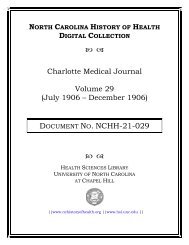
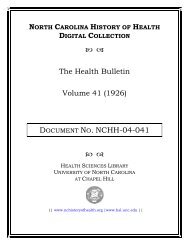
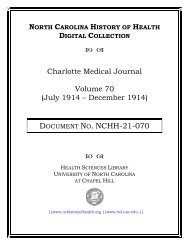
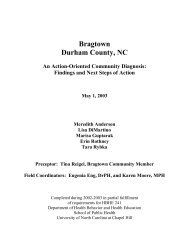
![Bulletin of the North Carolina Board of Health [serial] - University of ...](https://img.yumpu.com/48032016/1/153x260/bulletin-of-the-north-carolina-board-of-health-serial-university-of-.jpg?quality=85)
![The Health bulletin [serial] - University of North Carolina at Chapel Hill](https://img.yumpu.com/47603625/1/169x260/the-health-bulletin-serial-university-of-north-carolina-at-chapel-hill.jpg?quality=85)
![The Health bulletin [serial] - University of North Carolina at Chapel Hill](https://img.yumpu.com/47242858/1/169x260/the-health-bulletin-serial-university-of-north-carolina-at-chapel-hill.jpg?quality=85)
![The Health bulletin [serial] - University of North Carolina at Chapel Hill](https://img.yumpu.com/43204263/1/172x260/the-health-bulletin-serial-university-of-north-carolina-at-chapel-hill.jpg?quality=85)
![The Health bulletin [serial] - University of North Carolina at Chapel Hill](https://img.yumpu.com/41981074/1/163x260/the-health-bulletin-serial-university-of-north-carolina-at-chapel-hill.jpg?quality=85)
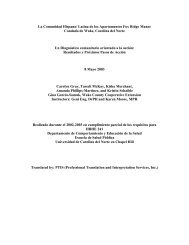
![The Health bulletin [serial] - University of North Carolina at Chapel Hill](https://img.yumpu.com/40912928/1/164x260/the-health-bulletin-serial-university-of-north-carolina-at-chapel-hill.jpg?quality=85)
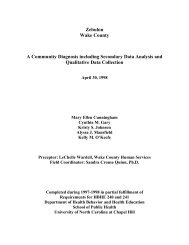
![The Health bulletin [serial] - University of North Carolina at Chapel Hill](https://img.yumpu.com/35643061/1/167x260/the-health-bulletin-serial-university-of-north-carolina-at-chapel-hill.jpg?quality=85)
![Biennial report of the North Carolina State Board of Health [serial]](https://img.yumpu.com/34024350/1/166x260/biennial-report-of-the-north-carolina-state-board-of-health-serial.jpg?quality=85)
